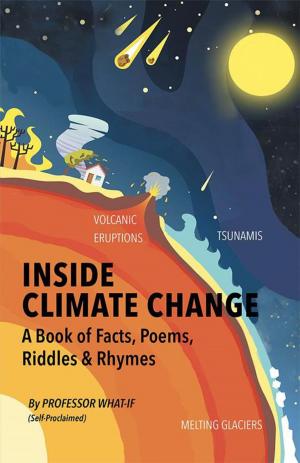| Author: | Ifedayo Akinwalere | ISBN: | 1230001070064 |
| Publisher: | Emgee publishing Ltd | Publication: | May 11, 2016 |
| Imprint: | Language: | English |
| Author: | Ifedayo Akinwalere |
| ISBN: | 1230001070064 |
| Publisher: | Emgee publishing Ltd |
| Publication: | May 11, 2016 |
| Imprint: | |
| Language: | English |
Science and Technology Reporting is the second book on journalism to be written by Mr. Ifedayo Akinwalere who is already becoming a prolific mass communication scholar and author. In this new book, Mr. Akinwalere is tackling yet another area of specialisation in news reporting that is often neglected by mass communication authors and scholars. This neglect is due to the fact that majority of communication scholars have arts background and are themselves, therefore, not well grounded in the sciences. It is, therefore, a bold venture for Mr. Akinwalere to take on this specialisation and produce a text on it for both journalism students and scholars.
Science and Technology Reporting gives the reader a clear understanding of what science and technology are all about and discusses all the different branches of science and technology. It also lets the reader know specific places, institutions and areas where the reporter can source for news relating to the subjects under discussion. The book goes further to let the reader know the most effective techniques to squeeze news from sources in science and technology and how to write and present such stories and features effectively and arrestingly.
The author must be commended for taking on these topics considering the dearth of materials on this area of specialisation in news reporting, and one has no hesitation in recommending the book to both students and scholars of journalism interested in reporting or teaching how to report science and technology.
The book couldn’t have come at a better time than now when emphasis in the society is laid on science and technology and when our country has redoubled its efforts to bring science and technology to the forefront of national development.
Science and Technology Reporting is the second book on journalism to be written by Mr. Ifedayo Akinwalere who is already becoming a prolific mass communication scholar and author. In this new book, Mr. Akinwalere is tackling yet another area of specialisation in news reporting that is often neglected by mass communication authors and scholars. This neglect is due to the fact that majority of communication scholars have arts background and are themselves, therefore, not well grounded in the sciences. It is, therefore, a bold venture for Mr. Akinwalere to take on this specialisation and produce a text on it for both journalism students and scholars.
Science and Technology Reporting gives the reader a clear understanding of what science and technology are all about and discusses all the different branches of science and technology. It also lets the reader know specific places, institutions and areas where the reporter can source for news relating to the subjects under discussion. The book goes further to let the reader know the most effective techniques to squeeze news from sources in science and technology and how to write and present such stories and features effectively and arrestingly.
The author must be commended for taking on these topics considering the dearth of materials on this area of specialisation in news reporting, and one has no hesitation in recommending the book to both students and scholars of journalism interested in reporting or teaching how to report science and technology.
The book couldn’t have come at a better time than now when emphasis in the society is laid on science and technology and when our country has redoubled its efforts to bring science and technology to the forefront of national development.
Science and Technology Reporting is the second book on journalism to be written by Mr. Ifedayo Akinwalere who is already becoming a prolific mass communication scholar and author. In this new book, Mr. Akinwalere is tackling yet another area of specialisation in news reporting that is often neglected by mass communication authors and scholars. This neglect is due to the fact that majority of communication scholars have arts background and are themselves, therefore, not well grounded in the sciences. It is, therefore, a bold venture for Mr. Akinwalere to take on this specialisation and produce a text on it for both journalism students and scholars.
Science and Technology Reporting gives the reader a clear understanding of what science and technology are all about and discusses all the different branches of science and technology. It also lets the reader know specific places, institutions and areas where the reporter can source for news relating to the subjects under discussion. The book goes further to let the reader know the most effective techniques to squeeze news from sources in science and technology and how to write and present such stories and features effectively and arrestingly.
The author must be commended for taking on these topics considering the dearth of materials on this area of specialisation in news reporting, and one has no hesitation in recommending the book to both students and scholars of journalism interested in reporting or teaching how to report science and technology.
The book couldn’t have come at a better time than now when emphasis in the society is laid on science and technology and when our country has redoubled its efforts to bring science and technology to the forefront of national development.
Science and Technology Reporting is the second book on journalism to be written by Mr. Ifedayo Akinwalere who is already becoming a prolific mass communication scholar and author. In this new book, Mr. Akinwalere is tackling yet another area of specialisation in news reporting that is often neglected by mass communication authors and scholars. This neglect is due to the fact that majority of communication scholars have arts background and are themselves, therefore, not well grounded in the sciences. It is, therefore, a bold venture for Mr. Akinwalere to take on this specialisation and produce a text on it for both journalism students and scholars.
Science and Technology Reporting gives the reader a clear understanding of what science and technology are all about and discusses all the different branches of science and technology. It also lets the reader know specific places, institutions and areas where the reporter can source for news relating to the subjects under discussion. The book goes further to let the reader know the most effective techniques to squeeze news from sources in science and technology and how to write and present such stories and features effectively and arrestingly.
The author must be commended for taking on these topics considering the dearth of materials on this area of specialisation in news reporting, and one has no hesitation in recommending the book to both students and scholars of journalism interested in reporting or teaching how to report science and technology.
The book couldn’t have come at a better time than now when emphasis in the society is laid on science and technology and when our country has redoubled its efforts to bring science and technology to the forefront of national development.















